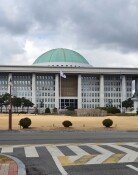Trade unions must stop self-harming the country’s economy
Trade unions must stop self-harming the country’s economy
Posted December. 02, 2022 07:36,
Updated December. 02, 2022 07:36
Korea’s exports fell for two months in a row, dipping by 14 percent in November year-on-year. The growth engine for the country’s economy is losing steam amid a global economic recession, decreasing exports for major trade items, the economic slowdown of China, the biggest trade partner for South Korea, and the indefinite strike of the Korean Public Service and Transport Workers’ Union Cargo Truckers’ Solidarity division (KPTU-TruckSol).
South Korea’s exports, which posted a minus growth for the first time in 20 months in October this year, fell even more steeply in November. Among the 15 major export items, 11 posted a degrowth, with semiconductors and petrochemicals suffering the most. Exports to China tanked by 25 percent owing to the lockdown on major Chinese cities to stave off Covid-19, while energy imports from China shot up by 27 percent, posting deficits for eight consecutive months.
In the third quarter, Korea’s GDP made a piecemeal growth at 0.3 percent quarter-on-quarter, with the strong domestic demand and facility investment offset by poor export performance. Prospect for the fourth quarter is even worse, with GDP growth dipping into minus, and many predict the growth rate will hover near the 1-percent range as exports are expected to continue to suffer strain next year. As stocks swell, capacity rates at Samsung Electronics’ smartphone and LG’s home appliances factories are quickly falling.
The strike by truckers, which marked the eighth day on Thursday, can deal a fatal blow to the poor exports. With the logistics crippled by the strike, shipping volumes from petrochemical companies plummeted to 30 percent compared to BAU levels. The shipping volumes from the 12 biggest port containers also plunged 40 percent, with the financial loss estimated to reach hundreds of billions of won. The damage will be further aggravated once the railway union steps in, with land distribution expected to be completely paralyzed. The construction sector, which has screeched to a halt owing to a lack of cement supplies, is another factor weighing down on the fourth quarter.
Having invoked a return-to-work order on cement truckers for the first time in the country’s history, the South Korean government is considering expanding the scope of the order to oil tankers. While the order is paying off with the truckers of cement and container industries returning to work for fear of losing licenses, an increasing number of local gas stations are suffering supply shortages due to the strike of road tanker drivers.
Announcing its plan for a nationwide general strike on Dec. 6, the Korea Confederation of Trade Unions is still playing hardball. On Tuesday, the second round of negotiations between the government and the truckers’ solidarity division also fell through merely 40 minutes into the talks. A turf war staged by unionized workers is a luxury that the Korean economy cannot afford. It is time to end their intransigency and brute confrontation as logistics are the veins of our economy and the strike is simply self-harming.
Headline News
- Med professors announce intention to leave hospitals starting Thursday
- Bridge honoring Sgt. Moon Jae-sik unveiled in Pennsylvania
- Chief of Staff Chung tells presidential secretaries to stay away from politics
- US FTC bans noncompete agreements
- N. Korea launches cyberattacks on S. Korea's defense companies







